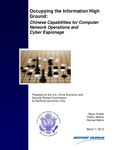Hardware Backdooring is practical - Jonathan Brossard (Toucan System) Florentin Demetrescu (Cassidian)
←
→
Page content transcription
If your browser does not render page correctly, please read the page content below
Hardware Backdooring is practical
Jonathan Brossard (Toucan System)
Florentin Demetrescu (Cassidian)DISCLAIMER
l We are not « terrorists ». We won't release our
PoC backdoor.
l The x86 architecture is plagued by legacy.
Governments know. The rest of the industry :
not so much.
l There is a need to discuss the problems in
order to find solutions...
l This is belived to be order of
magnitudes better over existing
backdoors/malwareAgenda
l Motivation : state level backdooring ?
l Coreboot & x86 architecture
l Flashing Coreboot on a motherboard
l State of the art in rootkitting, romkitting
l Introducing Rakshasa
l Evil remote carnal pwnage (of death)
l Why cryptography (Truecrypt/Bitlocker/TPM)
won't save us...State of the art, previous work
Previous work
l Early 80s : Brain virus, targets the MBR
l 80s, 90s : thousands of such viruses
l 2007, John Heasman (NGS Software) Blackhat US:
backdoor EFI bootloader
l 2009, Anibal Saco and Alfredo Ortega (Core security),
CanSecWest : patch/flash a Pheonix-Award Bios
l 2009, Kleissner, Blackhat US : Stoned bootkit. Bootkit
Windows, Truecrypt. Load arbitrary unsigned kernel
module.
l 2010, Kumar and Kumar (HITB Malaysia) : vbootkit
bootkitting of Windows 7.
l Piotr Bania, Konboot : bootkit any Windows (32/64b)DEMO : Silently Bootkitting windows
2008Introducing Rakshasa
Goals : create the perfect backdoor
l Persistant
l Stealth (virtually undetectable)
l Portable (OS independant)
l Remote access, remote updates
l State level quality : plausible deniability, non
attribution
l Cross network perimeters (firewalls...)
l RedundancyRakshasa : design
l Core components :
Coreboot
SeaBios
iPXE
payloads
Built on top of free software : portability, non
attribution, cheap dev (~4 weeks of work), really
hard to detect (without false positives).
l Payload : Reverse Engineered/Refactored
konboot payload (2 days of work).Rakshasa
l Flash the BIOS (Coreboot + PCI roms such as
iPXE)
l Flash the network card or any other PCI device
(redundancy)
l Boot a payload over the network (bootkit)
l Boot a payload over wifi/wimax (breach the
network perimeter, bypasses network detection,
I(P|D)S )
l Remotely reflash the BIOS/network card if
necessaryRakshasa : embedded features
l Remove NX bit (from BIOS or PCI)
=>executable heap/stack.
l Remove CPU updates (microcodes)
l Remove anti-SMM protections (=>local root)
=> Permantent lowering of the security level on
any OS. Welcome back to the security level of
1999.
=> Persistant, even if HD is remove/restored.
Optionally : Disable ASLR (bootkitting) by
patching the seed in kernel land on the fly on
Windows.Rakshasa : remote payload
l Bootkit future Oses
l Update/remove/reflash firmwares (PCI, BIOS)
l Currently capable of Bootkitting any version of
Windows (32b/64b)
l Use a minimal linux initrd in case we want to
mount/modify the filesystem (/etc/shadow on
any UNIX like, add new account with ADMIN
privileges on Windows, enable remote desktop
– possibly enable dual remote desktop on
Windows XP Pro by patching 2 dlls...)Rakshasa : stealthness
l We don't touch the disk. 0 evidence on the
filesystem.
l We can remotely boot from an alternate
payload or even OS : fake Truecrypt/Bitlocker
prompt !
l Optionally boot from a WIFI/WMAX stack : 0
network evidence on the LAN.
l Fake BIOS menus if necessary. We use an
embedded CMOS image. We can use the real
CMOS nvram to store encryption keys/
backdoor states between reboots.Rakshasa : why using Coreboot/
SeaBios/iPXE is the good approach
l Portability : benefit from all the gory reverse
engineering work already done !
l Awesome modularity : embbed existing
payloads (as floppy or cdrom images) and PCI
roms directly in the main Coreboot rom !
Eg : bruteforce bootloaders (Brossard, H2HC
2010), bootkits without modification.
l Network stack : ip/udp/tcp, dns, http(s), tftp,
ftp... make your own (tcp over dns? Over ntp ?)PCI rom from scratch (asm)
section .text
;--------------------------
; Bios expension ROM header
;--------------------------
db 0x55 ; Signature
db 0xaa ; Signature
db 17 ; number of sectorsDEMO : Evil remote carnal pwnage
(of death)
I can write blogs too... Muhahahaha...Rakshasa
l Flash the BIOS (Coreboot + PCI roms such as
iPXE)
l Flash the network card or any other PCI device
(redundancy)
l Boot a payload over the network (bootkit)
l Boot a payload over wifi/wimax (breach the
network perimeter, bypasses network detection,
I(P|D)S )
l Remotely reflash the BIOS/network card if
necessaryHow to properly build a botnet ?
l HTTPS + assymetric cryptography (client side
certificates, signed updates)
l Fastflux and/or precomputed IP addresses
If Microsoft can do secure remote updates, so
can a malware !
l
Avoid DNS take overs by law enforcement
agencies by directing the C&C rotatively on
innocent web sites (are you gonna shut down
Google.com?), use assymetric crypto to push
updates.Why crypto won't save you...
Why crypto won't save you...
l We can fake the bootking/password prompt by
booting a remote OS (Truecrypt/Bitlocker)
l Once we know the password, the BIOS
backdoor can emulate keyboard typing in 16b
real mode by programming the keyboard/
motherboard PIC microcontrolers (Brossard,
Defcon 2008)
l If necessary, patch back original BIOS/
firmwares remotely.How about Avs ??
l Putting an AV on a server to protect against
unknown threats is purely cosmetic.
l You may as well put lipstick on your servers...Example : 3 years old bootkit
Example : 3 years old bootkit (+
simple packer)Realistic attack scenarii
Realistic attack scenarii
l Physical access :
Anybody in the supply chain can backdoor your
hardware. Period.
Flash from a bootable USB stick (< 3mins).
l Remote root compromise :
If (OS == Linux) {
flash_bios;
} else {
Pivot_over_the_MBR ;
}Realistic attack scenarii l Purchase pre-backdoored hardware
BONUS : Backdooring the
datacenterRemediation
Remediation (leads)
l Flash any firmware uppon reception of new hardware with
open source software
l Perform checksums of all firmwares by physically
extracting them (FPGA..) : costly !
l Verify the integrity of all firmwares from time to time
l Update forensics best practices :
1) Include firmwares in SoW
2) Throw away your computer in case of intrusion
Even then... not entirely satisfying : the backdoor can flash
the original firmwares back remotely.Side note on remote flashing
l BIOS flashing isn't a problem : the flasher
(Linux based) is universal.
l PCI roms flashing is (a bit of) a problem :
vendor dependant...Detecting network card
manufacturer from the remote C&C
l IPXE allows scripting. Eg : sending the MAC
address as an URL parameter.
l From the MAC, get the OUI number serverside.
l From the OUI number, deduce manufacturer
l Send the proper flashing tool as an embedded
OS to the backdoor...Questions ?
You can also read
























































